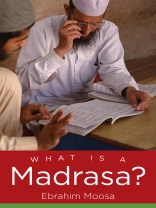Taking us inside the world of the madrasa — the most common type of school for religious instruction in the Islamic world — Ebrahim Moosa provides an indispensable resource for anyone seeking to understand orthodox Islam in global affairs. Focusing on postsecondary-level religious institutions in the Indo-Pakistan heartlands, Moosa explains how a madrasa can simultaneously be a place of learning revered by many and an institution feared by many others, especially in a post-9/11 world.
Drawing on his own years as a madrasa student in India, Moosa describes in fascinating detail the daily routine for teachers and students today. He shows how classical theological, legal, and Qur’anic texts are taught, and he illuminates the history of ideas and politics behind the madrasa system. Addressing the contemporary political scene in a clear-eyed manner, Moosa introduces us to madrasa leaders who hold diverse and conflicting perspectives on the place of religion in society. Some admit that they face intractable problems and challenges, including militancy; others, Moosa says, hide their heads in the sand and fail to address the crucial issues of the day. Offering practical suggestions to both madrasa leaders and U.S. policymakers for reform and understanding, Moosa demonstrates how madrasas today still embody the highest aspirations and deeply felt needs of traditional Muslims.
About the author
Ebrahim Moosa is Mirza Family Professor in Islamic Thought and Muslim Societies at the University of Notre Dame.







![Cover of Brian Schrag & Julisa Rowe: Community Arts for God's Purposes [Chinese] 貼近神心意的社群藝術 Cover of Brian Schrag & Julisa Rowe: Community Arts for God's Purposes [Chinese] 貼近神心意的社群藝術](https://static.worldofdigitals.com/thumb_webp/740/9781645083740.webp)




